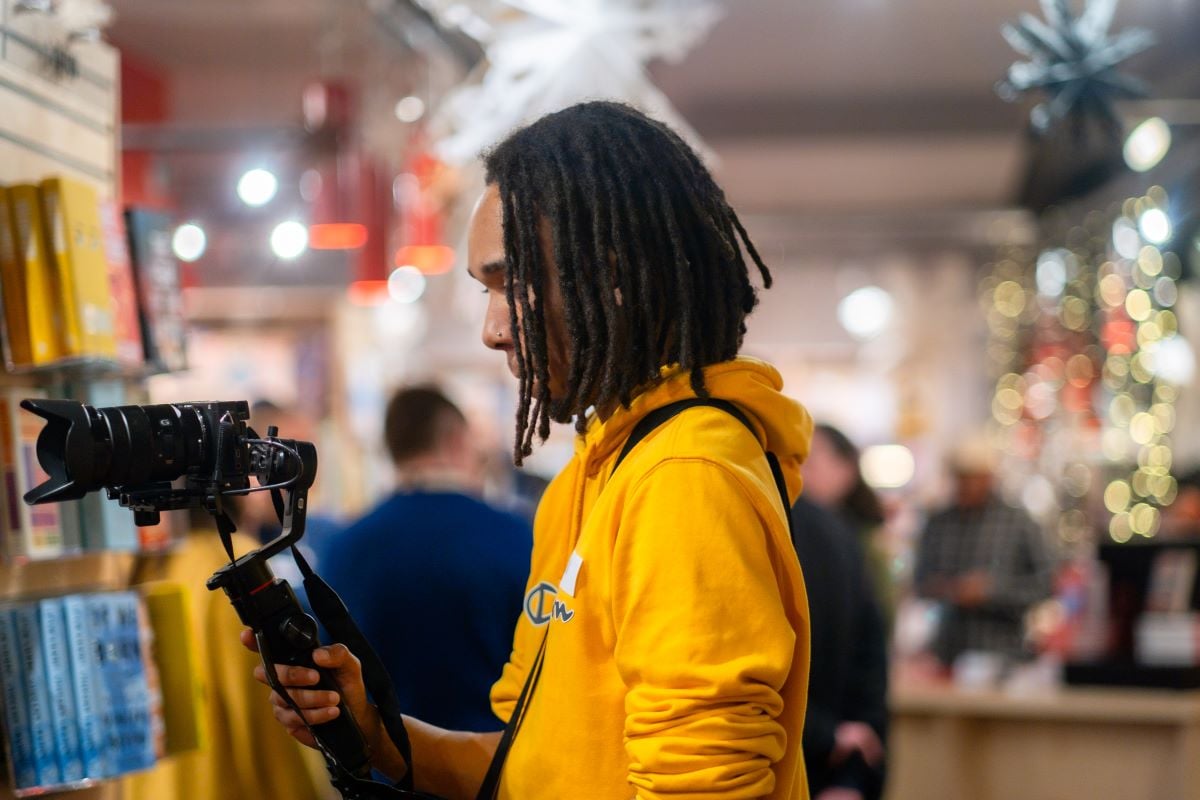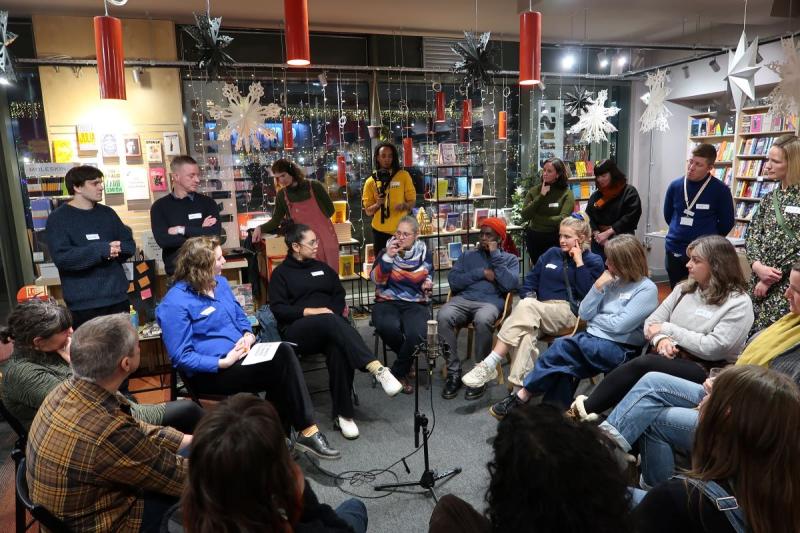
Photo: Olumide Osinoiki/Rising Arts Agency
Power in partnerships
In their latest collaborative research project, Euella Jackson and Jess Bunyan of Rising Arts Agency have been exploring the unequal balance of power inherent in partnership working.
As a radical, youth-led creative agency, Rising sits at an interesting intersection between underrepresented communities of creative young people, established cultural institutions and everything in between.
Through centring the voices of young people, we produce work to radically transform the world. We can’t do it alone, so a large part of our effort involves working with cultural organisations as partners to create the social change our community so desperately want to see.
From that place, we see the ways communities have been exploited in the name of engagement, the ways the sector fails to invest adequately in marginalised people yet profits from their stories, and the ways partnerships that claim to work alongside grassroots organisations can feel extractive at best and harmful at worst.
Partnership working is increasingly problematic as we find ourselves at risk of mission drift or of compromising our values.
The problem with partnerships
The cultural sector relies heavily on collaboration with grassroots organisations and marginalised creatives to fulfil funder requirements and reach new audiences. With a scarcity of funding and a growing emphasis on building new audiences, there is increasing pressure for cultural institutions to form these partnerships.
Current and prospective National Portfolio Organisations (NPOs) are marked against a criterion of Inclusivity and Relevance as part of Arts Council England’s Let’s Create Strategy Investment Principles. They are expected “to build closer connections with their communities, particularly those that they are currently under-serving”.
While it is widely accepted that these collaborations have the potential to create exciting new work and wider cultural impact, they can exacerbate existing inequalities in the sector and hinder real inclusion.
Expectations for organisations to partner with community organisations, without equitable frameworks to manage them, often fail to consider the (invisible) labour, costs and tensions that arise for those grassroots organisations. Without deep interrogation of the function these partnerships serve, we risk maintaining the status quo of mediocracy, extraction and harm.
Partnerships as a site of power
Equitable partnership working is central to transforming the sector, but only if we address the elephant in the room: power. Power dictates who manages and initiates the partnership, who has the power to say no and step away, and who sets the direction and scope of the work.
Differences in funding, capacity, infrastructure, proximity to resources, capital and lived experience can impact how partnerships are managed and materialised. When not explicitly acknowledged and addressed, power imbalances can be a source of real harm for individuals, projects, organisations and partnerships.
As part of our Collaborate-funded research, we partnered with Dr Andreana Drencheva of King’s College London to explore the current landscape of partnership working and develop new models for equitable partnerships. We conducted interviews with marginalised creatives, members of grassroots organisations and cultural institutions of various sizes and disciplines.
In the research, we found numerous instances of power imbalances having real life impacts such as burnout, stress and overload. These were significant among grassroots organisations and marginalised creatives but were also present for people in cultural institutions. For instance, individuals and small teams working in engagement, accessibility and learning departments operated like grassroots organisations inside institutions and faced the same or similar power imbalances.
 Rising Arts Agency event. Photo: Euella Jackson
Rising Arts Agency event. Photo: Euella Jackson
You can’t challenge what you can’t see
There was strong consensus from respondents about what a genuine, co-created partnership means – and we want to stress that our partnership working with Andreana was very equitable. But very few of our research participants experienced it in practice and struggled to recall examples of equitable partnership working.
Despite seeing partnerships as of mutual benefit, we found many instances where grassroots organisations were expected to act in service of cultural institutions through ‘‘sector-support work, such as anti-racism training, education workshops, audience development workshops”, which often was at odds with their own mission, priorities or strategy.
Unchecked assumptions that cultural institutions are the lead partner in funding bids means they often set the tone, direction and pace of a partnership, while their ‘junior’ partners have to shapeshift to meet the demands of delivery. We found some grassroots organisations were named in bids they were not consulted on, were not credited on joint projects, and their input was not recognised.
When initiating a partnership, conversations rarely acknowledged power, focusing on the outputs or benefit of collaboration, not the complexities and tensions around doing it well. They certainly didn’t use the partnership as an opportunity to redress the systemic inequalities. Without this, the burden sits with marginalised creatives to navigate power imbalances. They support the larger institutions to fulfil their strategic aims, without benefit to themselves.
Barriers to reclaiming and redistributing power
“We’re a small team” was claimed by both grassroots and cultural institutions. Real and perceived limitations of capacity – and not having equitable, empathetic and care-centred processes for beginning and ending partnerships well – created barriers to acknowledging and redressing power imbalances.
The Director of one NPO said: “There is a reason resources are allocated the way they are…we are much more involved in the delivery of the project. So, it seems like we have power but that’s because we did and do a much bigger chunk of the work”.
Views like this fail to consider the historical and cumulative impacts of unequal power and the invisible labour marginalised creatives do to make partnerships work – creating safe spaces, minimising reputational damage associated with ‘selling out’ and working with minimal resources.
Time needs to be invested in developing partnerships delivered to mutually-agreed timelines, where work and budgets are shared. A focus on the practical rather than structural issues facing the sector, feeds into a culture that is reluctant to have the difficult conversations that lead to transformative, mutually-enriching partnerships that re-energise communities and places.
Co-creating utopian futures
Interrogating why an organisation has more resources, or the legacies of privilege that it has benefitted from, can be a useful starting point for sharing power. Building in safe, reflective spaces to acknowledge current and historical legacies of harm, and embedding reparative systems to build trust and empathy can go a long way in developing inclusive partnerships that have longevity and legacy.
Now more than ever, we – the artists – need to lead the way in creating the radical futures we deserve. We need to work together to co-create and dream up new ways to experience culture. To reimagine the cultural sector as a rich ecology where creativity shapes our places and thrives in our communities, there needs to be an honest, sector-wide conversation about power.
Euella Jackson and Jo Bunyan are Co-Directors of Rising Arts Agency.
![]() www.rising.org.uk
www.rising.org.uk
![]() @RisingArtAgency
@RisingArtAgency
![]() euella-jackson/ | jessbunyan/
euella-jackson/ | jessbunyan/
Join the Discussion
You must be logged in to post a comment.